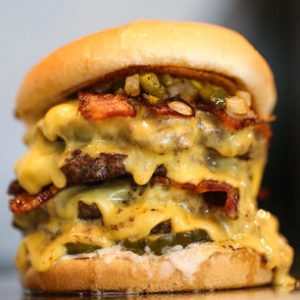Something new here, by way of a story on ‘foods we should avoid’. Rather than rating specific foods according to their healthiness, I found a study ranking everyday foods ranks according to their inher-ent addictiveness…
 Even the world’s ‘best pizza (above) is full of fats, carbs and salt…
Even the world’s ‘best pizza (above) is full of fats, carbs and salt…
The association between processed foods and health risks is now well-known. And it should be; it’s an important issue. But the issue of addictiveness is also important. Maybe more so, when it comes to how difficult it might be to kick a bad dietary habit…
More than one study
There have been a number of studies since the millennium, looking at the addictiveness of some foods and how that might contribute to their abuse.
A 2023 Scientific American article examined a variety of recent studies on the nature of food addict-iveness, attempting to come to a consensus on the question. Alas, the final word was, “the issue is by no means settled.”
Compelling examples
The SciAm article, nevertheless, opens with some compelling examples of how ‘addictive behaviour’, associated particularly with sugary foods, works…
“Given the option, most [lab] rats will choose sugar instead of cocaine. Their lust for the carbohyd-rate is so intense that they will go as far as to self-administer electric shocks in their desperation to consume sugar.”
Similarly… “People who’ve had bariatric [stomach restriction] surgery sometimes continue to overin-dulge in highly processed foods, those made from white flour, sugar, butter, and the like, even if it means later enduring vomiting and diarrhea.”
“Daily snacking on processed foods, recent studies show, rewires the brain’s reward circuits. Cravings for tasty meals light up the brain just like cravings for cocaine do, prompting some researchers to ask whether products such as fries or cookies can trigger addiction akin to that associated with drugs or alcohol.”
Dark omens
What’s worse, it seems clear that the foods we are doomed to become most addicted to are among the least healthy out there.
A survey article on deposit at the US National Library of Medicine concluded that, “as many as 20 percent of people may have a food addiction.”
The usual suspects
A companion(2015) article lists (in no particular order) what may be the most addictive foods we commonly consume:
- Pizza
- Chocolate
- Chips
- Cookies
- Ice cream
- French fries
- Cheeseburgers
- Soda (not diet)
- Cake
- Cheese
Unequivocal results
Contrary to the conclusions drawn by the SciAm article, this earlier study clearly implicated a list of everyday foods common in the so-called Western Diet as the most addictive. And I immediately re-cognised them as sharing a number of key characteristics.
First, these foods are all considered highly- or ultra-processed.
Second, they’re uniformly high in one or more addictive ingredient – sugar, fat and/or salt.
Another factor that might help make them hard to resist: they can all be obtained on a ‘grab-and-go’ basis. And most are traditionally eaten with the hands. All too easy to indulge a craving!
My take
I have no illusions. Processed – especially ultra-processed – foods are inherently addictive. And that may be a crucial factor in why so many folks over-eat and become dangerously overweight or obese. So it should be no surprise to anyone that 2/3 of Brits, Europeans and North Americans qualify as overweight or obese.
We keep hearing about how the global Obesity Crisis is costing huge numbers of us to suffer a whole catalogue of direct and associated ills. And costing society hundreds of billions of dollars every year to treat them.
If food addiction is – as it clearly appears to be – a leading cause of obesity, obesity needs to be treated as a consequence of addiction. And that, logically, would call for a new medical view of food addiction, plus appropriate government-mandated rules and regulations protecting potentially addicted people from their own worst instincts!
Meanwhile…
Stay away from the Top 10 most addictive foods!
~ Maggie J.

